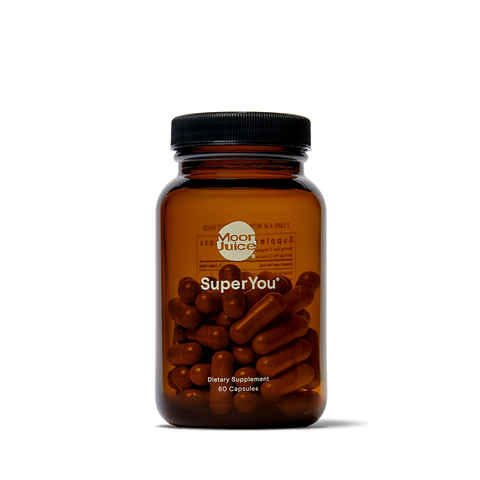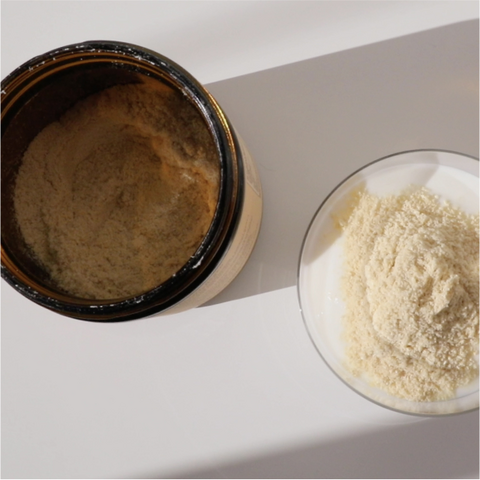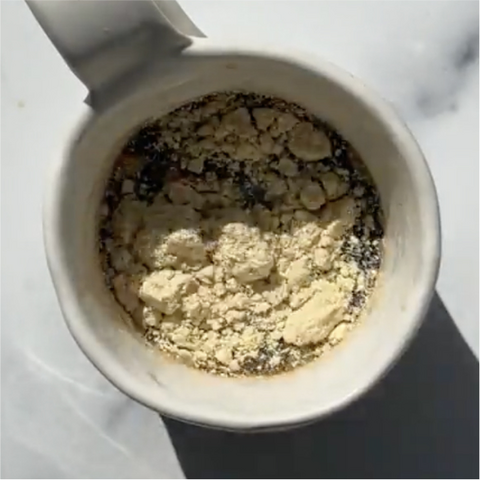The immune system is complex and the concept of "boosting" oversimplifies its intricacies. The immune system cannot be "boosted" — it requires balance and harmony to function properly.
Nourishing your body with nutrient-filled fuel helps provide your immune system with the building blocks it needs to stay healthy and strong.
How Can I Balance My Immune System Naturally?
Your daily habits can play a big role in promoting a healthy immune system, including:
- Drinking plenty of water — You should drink at least half your body weight in fluid ounces per day, about 85oz for women. But most people don’t drink enough H2O. Having a water bottle within reach might help remind you to drink more.
- Regularly sweating it out — The latest US Physical Activity Guidelines recommend getting at least 150 minutes of moderate to intense exercise per week. Exercising, whether you go with yoga or running, can help lower stress levels and improve sleep quality, in turn, benefiting your immune health.
- Getting your Zzz’s — Getting at least 8 hours of sleep nightly supports the production of infection-fighting proteins called Cytokines.
Getting at least 8 hours of sleep nightly supports the production of infection-fighting proteins called Cytokines.
- Eating a varied diet rich in plant-based foods — Your body needs fuel to function optimally. Giving it the right energy sources doesn’t just help keep you alert and active. It also keeps your immune system in tip-top shape.
Can Eating Certain Foods Balance My Immune System?
Nourishing your body with plenty of vitamins and minerals helps support a balanced immune system.
You’ll get more bang for your buck if you eat a variety of nutrient-rich foods than if you stick with a single immune system-friendly food, so try to mix things up when incorporating the foods below into your diet.
30 Immunity-Balancing Foods You Can Start Making Today
Citrus fruits
Zesty, juicy citrus fruits contain high amounts of Vitamin C, a powerful antioxidant known to neutralize cell-damaging free radicals. The vitamin also stimulates white blood cells, which help your body fight off infection, and can boost your immune system.
Citrus also contains plenty of fiber, which is essential for gut health. And research shows a healthy gut microbiome plays a vital role in immune health.
Inflammation is a normal part of the immune response. Too much inflammation, though, can have harmful effects, and fiber can help regulate your body’s inflammatory response.
Garlic
People have touted the health benefits of garlic for centuries. And many folk remedies involve using garlic in some way or fashion, like putting garlic cloves in the ears to help with ear infections.
And it turns out people were onto something. Research shows that garlic contains many immune-supporting compounds and that it can help stimulate certain types of cells like lymphocytes and macrophages. Lymphocytes are white blood cells that help your body recognize foreign invaders, like viruses. A T-cell is a type of lymphocyte. Macrophages are another type of white blood cell that can gobble up pathogens, breaking them down so T-cells can build a targeted response to the offending invader.
Broccoli
Whether you like it roasted or raw, broccoli is a good source of the antioxidants Vitamin C, Beta-Carotene, and Lutein. One ½ cup of cooked broccoli contains about 57% of the Recommended Dietary Allowance (RDA) of Vitamin C.
Bell peppers
Another good source of Vitamin C? Bell peppers, also known as sweet peppers. Of the different colored bell peppers, red ones have the highest amount of Vitamin C, clocking in at 95 milligrams (mg) per ½ cup. They also supply about 13% of your RDA for Vitamin A, which also plays an important role in supporting your immune system by stimulating white blood cell production.
Yogurt
Yogurt that contains probiotics can help support gut health. Your gut microbiome is an important part of the immune system, and imbalances can impact your immunity. When adding yogurt to your grocery cart, look for options low in added sugar. Eating too much sugar can have an adverse effect on your gut health, and, in turn, your immune response.
Ginger
Ginger’s active compounds, gingerols, shogaols, and paradols, have well-known antioxidant and anti-inflammatory properties. There’s even evidence that ginger can boost your body’s production of inflammatory cytokines and support natural killer (NK) cells, which target and kill harmful cells like tumor and virus cells.
Almonds
These nuts make a great snack and are full of Vitamin E, a powerful antioxidant that minimizes oxidative stress and enhances the function of certain white blood cells, including T cells and NK cells.
Additionally, one 2016 study involving parents and their kids found that eating more almonds helped not only improved diet quality but also helped maintain gut health.
Turmeric
People around the globe have used this golden spice in traditional medicine and cooking for thousands of years. Its active ingredient, Curcumin, has anti-inflammatory and antioxidant properties, giving it a natural ability to modify your body’s defense mechanism. It can enhance the activity of various cells crucial for immune function, including T-cells.
Try it in a Golden Spirit, a warming anti-inflammatory tonic.
Shiitake mushrooms
These tasty mushrooms contain Beta-Glucans, which have been linked to improved immune function. These sugars send messages to your cells and impact your immunity.
Spinach
This dark leafy green is high in many nutrients that can help support your immunity, including Vitamin C, Vitamin E, and Vitamin A. One hundred grams (g) of raw spinach contains 15% of your RDA for Vitamin C and 60% of your RDA for Vitamin E.
Green tea
Green tea is full of antioxidants, including catechins, a type of antioxidant known to support immunity. One 2020 study found that healthcare workers who regularly drank a catechin beverage had significantly fewer respiratory illnesses than those in the control group.
Sweet potatoes
Bright orange sweet potatoes are high in Beta-Carotene, a nutrient that the body converts to Vitamin A, which helps support immune health.
Papaya
Rich in Vitamin C — double the RDA — papaya also contains papain, which has anti-inflammatory effects.
Sunflower seeds
Crunchy sunflower seeds are an excellent source of antioxidant Vitamin E. A 100 g serving contains a satisfying 21 g of protein and 81% RDA Magnesium.
Kiwi
This tiny, flavorful fruit that hails from New Zealand is chock-full of Vitamin C. And did you know that you can also eat the skin? It has a pleasantly tart flavor that nicely balances with the fruit’s sweet flesh, and is full of fiber.
Kimchi
Fermented foods like kimchi contain probiotics that help support gut health and the immune system. Other examples of fermented foods include tempeh, miso, and sauerkraut.
Oats
Like shiitake mushrooms, oats also contain Beta-Glucans, a type of soluble fiber that supports immune function. Oats are also full of other essential nutrients like Zinc, Iron, Selenium, and fiber.
Berries
Berries of all kinds are excellent sources of antioxidants, including Indian Gooseberry, or Amla, which give them their immune-strengthening effects. Amla is the second richest natural source of Vitamin C in the world. A single berry contains between 600 to 700 mg of Vitamin C.
Amla is the second richest natural source of Vitamin C in the world. A single berry contains between 600 to 700 mg of Vitamin C.
Lentils
These protein-packed legumes are rich in essential nutrients like folate, iron, and zinc. They’re also high in fiber and contain polyphenols, antioxidants that may help regulate blood sugar levels and promote healthy digestion.
Chia seeds
These tiny, crunchy seeds are rich in antioxidants and fiber. A 2 ½ tablespoon serving contains about 10 g of fiber, or 30% RDA. They’re also a source of anti-inflammatory Omega-3 fatty acids, which play an important role in supporting immune function. In addition to strengthening cell walls, they also help macrophage cells eat up diseased and infected cells.
Try meal prepping a big batch of Adaptogenic Blue Pudding to have for breakfast during the week.
Brazil nuts
These hearty nuts are rich in the mineral Selenium, which plays a role in regulating immune function. Evidence suggests that adequate Selenium levels are essential for maintaining immune health, and Selenium deficiency may make you more susceptible to illness.
Kale
Leafy green veggies like kale are typically high in Vitamin C, Iron, and other vitamins and nutrients that help support immune health. They may also help balance your gut.
Hazelnuts
These luxurious, flavorful nuts are high in Vitamin E, which helps protect against oxidative stress. They also contain Vitamin C, Iron, and heart-healthy essential fatty acids.
Quinoa
There’s a good reason quinoa is a staple of vegan and vegetarian pantries. It’s a great source of plant-based protein and contains all nine essential amino acids essential for immune health. A single cooked cup of the grain provides 8.14 g of protein.
Quinoa also contains antioxidants like Vitamin E and is a source of Iron, fiber, and Magnesium.
Chickpeas
Chickpeas are versatile legumes high in protein, Iron, and Zinc. They’re also filled with fiber and may help you boost your fiber intake, which can help with digestion and overall gut health.
Reishi mushrooms
These rare mushrooms are popular in Eastern medicine and contain nutrients, like peptides and Beta-Glucans, that may help promote a balanced immune system and control inflammation. These nootropic mushrooms can also help balance mood and support concentration!
Pomegranate
This Mediterranean fruit is well-known for its impressive antioxidant content. And research suggests that it’s not just the sweet-bursting seeds that pack a punch. All parts of the pomegranate seem to have antimicrobial properties.
Egg yolks
Egg yolks are also high in Vitamin D, which helps support your immune system in attacking invaders like viruses.
Buckwheat
Buckwheat, a grain-like seed harvested from the flowering plant of the same name, is a source of fiber and antioxidants, both of which help regulate the immune system.
Poultry
Poultry is high in Vitamin B6, a vitamin that plays an essential role in producing disease-fighting T-cells. And a lack of Vitamin B6 can actually cause immune dysfunction.
Boosting Your Immune System With Supplements
Eating a whole-food diet is important for promoting a diverse gut microbiome and supporting a balanced immune system. But sometimes, it can be challenging to get all the nutrients your immune system needs through food alone.
Supplementing daily with proven immunity allies keeps you balanced and resilient. That’s where an immune boosting supplement such as SuperPower® comes in.
SuperPower® is a clinical strength blend of 4 fundamentals (Vitamin C, Vitamin D, Zinc, Reishi) to help support healthy immunity.
- Liposomal Vitamin C is required in high concentrations by cells that initiate the first line of defense.*
- Vitamin D, extracted from Organic Button Mushrooms, is used by the body to balance the immune response.*
- Chelated Zinc is essential for the development and function of immune cells.*
- Beta-Glucans from Organic Reishi help modulate immunity by activating cells for a quick response.*
Take 1 cap daily for maintenance. If you feel your system is compromised, take 3 caps daily for 10 days.
Sign Up, Nerd Out
Get wellness tips, education, and recipes
delivered straight to your inbox.
Get wellness tips, education,
and recipes delivered
straight to your inbox.
Sources
- Allegra A, et al. (2022). The impact of curcumin on immune response: An immunomodulatory strategy to treat sepsis. https://www.mdpi.com/1422-0067/23/23/14710
- Arreola R, et al. (2015). Immunomodulation and anti-inflammatory effects of garlic compounds. https://www.hindawi.com/journals/jir/2015/401630/
- Bains JS, et al. (2022). Stress and immunity — the circuit makes the difference. https://www.nature.com/articles/s41590-022-01276-1
- Burns AM, et al. (2016). Diet quality improves for parents and children when almonds are incorporated into their daily diet: A randomized, crossover study. https://pubmed.ncbi.nlm.nih.gov/26773784/
- Dai X, et al. (2015). Consuming lentinula edodes (shiitake) mushrooms daily improves human immunity: A randomized dietary intervention in healthy young adults. https://pubmed.ncbi.nlm.nih.gov/25866155/
- Furushima D, et al. (2020). Prevention of acute upper respiratory infections by consumption of catechins in healthcare workers: A randomized, placebo-controlled trial. https://www.ncbi.nlm.nih.gov/pmc/articles/PMC7019590/
- Ganesan K, et al. (2017). Polyphenol-rich lentils and their health promoting effects. https://www.ncbi.nlm.nih.gov/pmc/articles/PMC5713359/
- Goraya RK, et al. (2015). Enhancing the functional properties and nutritional quality of ice cream with processed amla (Indian gooseberry). https://www.ncbi.nlm.nih.gov/pmc/articles/PMC4648887/
- Guggenheim AG, et al. (2014). Immune modulation from five major mushrooms: Application to integrative oncology. https://www.ncbi.nlm.nih.gov/pmc/articles/PMC4684115/
- Howell AB, et al. (2013). The pomegranate: Effects on bacteria and viruses that influence human health. https://www.ncbi.nlm.nih.gov/pmc/articles/PMC3671682/
- Huang Z, et al. (2018). Role of vitamin A in the immune system. https://www.ncbi.nlm.nih.gov/pmc/articles/PMC6162863/
- Jafarzadeh A, et al. (2021). Therapeutic potential of ginger against COVID-19: Is there enough evidence. https://www.sciencedirect.com/science/article/pii/S2095754821000661
- Kim HS, et al. (2011). Stimulatory effects of B-glucans on immune cells. https://www.ncbi.nlm.nih.gov/pmc/articles/PMC3202617/
- Kim Y, et al. (2016). Polyphenols and glycemic control. https://www.ncbi.nlm.nih.gov/pmc/articles/PMC4728631/
- Laparra JM, et al. (2010). Interactions of gut microbiota with functional food components and nutraceuticals. https://pubmed.ncbi.nlm.nih.gov/19914380/
- Lewis ED, et al. (2020). Regulatory role of vitamin E in the immune system and inflammation. https://www.ncbi.nlm.nih.gov/pmc/articles/PMC7011499/
- Mashhadi NS, et al. (2013). Anti-oxidative and anti-inflammatory effects of ginger in health and physical activity: Review of current evidence. https://www.ncbi.nlm.nih.gov/pmc/articles/PMC3665023/
- Miles EA, et al. (2021). Effects of citrus fruit juices and their bioactive components on inflammation and immunity: A narrative review. https://www.ncbi.nlm.nih.gov/pmc/articles/PMC8264544/
- Percival SS. (2016). Aged garlic extract modifies human immunity. https://pubmed.ncbi.nlm.nih.gov/26764332/
- Rayman MP. (2002). The argument for increasing selenium intake. https://pubmed.ncbi.nlm.nih.gov/12133202/
- Satokari R. (2020). High intake of sugar and the balance between pro- and anti-inflammatory gut bacteria. https://www.ncbi.nlm.nih.gov/pmc/articles/PMC7284805/
- Stach K, et al. (2021). Vitamin B6 in health and disease. https://www.ncbi.nlm.nih.gov/pmc/articles/PMC8467949/
- Venter C, et al. (2022). Role of dietary fiber in promoting immune health—An EAACI position paper. https://onlinelibrary.wiley.com/doi/10.1111/all.15430
- Vitamin C. (2020). https://www.hsph.harvard.edu/nutritionsource/vitamin-c/
- Vitamin C. (2021). https://ods.od.nih.gov/factsheets/VitaminC-HealthProfessional/
- Why micronutrients matter. (2022). https://www.cdc.gov/nutrition/micronutrient-malnutrition/about-micronutrients/why-it-matters.html
- Yan F, et al. (2014). Probiotics and immune health. https://www.ncbi.nlm.nih.gov/pmc/articles/PMC4006993/

.jpg?v=1757541353003)














